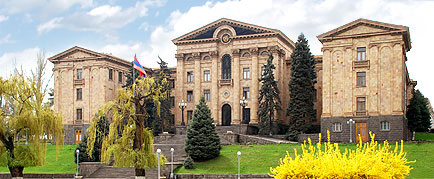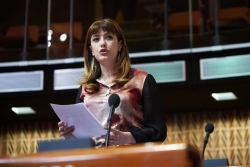“Today is a day that very strongly unites Armenians all over the world. Today is the day, when many of us remember the stories of our own families, scary stories how our grandparents were suffering the horror of massacres, of deaths, of blood, blood of beloved ones, how they, being very young, were trying to escape assassins, murdering their families just in their presence…
This massacre of Christians at the beginning of the 20th century on the territory of the Ottoman Empire was pure Genocide, which was the implementation of the planned policy of the Young Turk Government. A million and a half Armenians were brutally tortured and killed… The adequate estimation of this historical truth is necessary not only for us, for the descendants of the innocent victims or survived ones, but also for everyone, even those who committed the Genocide.
Never again…
Impunity gives birth to new crimes, and today the most important thing we can do is to unite our efforts to prevent genocides. Today Armenia acts as an initiating country to unite peoples and nations for this; beginning from the year of Centennial of the Armenian Genocide in 2015 we are organizing big consolidating conferences in Armenia to invite the specialists all over the world to take part and find ways of the joint fight against this disaster.
Year by year the number of the states and international organizations that have recognized the Armenian Genocide and condemned the denial of it increase. On 12 April 2015, Pope Francis during the first joint liturgy of the Catholic and Orthodox Churches in Saint Peter’s basilica noticed that in the past century the mankind had lived three tragedies, and the first was the genocide of the Armenian people.
Unfortunately, today we see multiple examples of barbaric actions based on some ethnic or religious reasons. The present ongoing terror of so-called Islamic state may be a result of closing eyes on some facts in the past and, let me be mistaken, but may bring us to more tragic events in future. Genocide must not only be recognized, but also we should condemn the denial of it. Only realizing and understanding the mistakes of the past may lead us to future without violence, without massacres, without horror and terror.
GENOCIDE… This is a phenomenon, a reality that all of us must unite to prevent. My family has its own sad story as well. And I don’t want any person of any nation to have a story like this.”
“Before my speech I want to say once more that yesterday, April 24 was the Day of Commemoration of the Armenian Genocide innocent victims. Never again, and today we must unite our efforts to prevent such barbaric acts towards humanity.
Now let me shift to the main topic of my speech, about elections. I would like to advise my Azeri colleague while talking about international organizations to use correct names, correct position, and especially as a member of PACE read PACE election observation official reports, where in the first article is written that Armenian elections were held with the absolute respect to fundamental human rights and fundamental freedoms. And don’t read only what is written in the Azeri media.
Now let me introduce some facts about our elections. As you know, in the reporting period Armenia held parliamentary elections, which were totally news for us - beginning from the new State Governance Parliamentary System by the New Constitution and up to the newly developed and improved voting system with a quite new technical support, live broadcasting from all polling stations, and other mechanisms called to secure the validity of the electoral processes. These technical changes absolutely exclude any possibility of any falsification, and what is most important they bring real trust of the voters towards the electoral process.
Armenia is making a transition to a new system of governance, and it is necessary to underline that all these changes dealing with the mechanisms called to secure the validity of the electoral processes were done as a result of long-lasting wide political and social discussions that have been ended with total consensus between the political parties - ruling and opposition, and civil society. The New Electoral Code has been changed even after the main adoption by the request of opposition and we have accepted all the suggestions.
And the goal was achieved - we have had the trust of voters.
I would like to underline with pride the active participation of mass media, social networking and civil society in the election processes. Besides international observation missions the government of Armenia has engaged in the observation mission a large number, over 30 thousand representatives of local public organizations, which also include a big number of foreign observers. The campaigning was strictly broadcast balanced and fairly, and on the Election Day there was a live broadcasting from polling stations. Hot-line service of Police was available 24 hours a day.
Of course, there is no need to compare with our neighbouring countries and seek evidence in terms of strict differences of our systems, but one thing is most important to figure out - if you really have a strong political will to have progressive country, you need to understand that there is no alternative to Democracy.” “The topic is important and needs to be at the centre of our attention because of its implications for human rights and basic freedoms. We should stress the importance of Interpol as an efficient instrument for inter-state and international co-operation in the fight against transnational crime. However, we should underline one important thing clearly: no country is allowed to use the reputation and name of Interpol to reach its own goals, especially in the pursuit of political aims.
The report rightly mentions examples of the abuse of the Interpol system. Several member States, often knowingly, have attempted to violate Article 3 of Interpol's constitution, which strictly prohibits any intervention or activities of a political, military, religious or racist character. A few such cases relate to Azerbaijan’s requests placed with Interpol. In one case, Azerbaijan asked Belarus to detain travel blogger Alexander Lapshin, among whose so-called crimes was a criticism of the Azeri Government and a visit to the Nagorno-Karabakh Republic, which successfully broke away from Soviet Azerbaijan over a quarter a century ago. Interpol refused Azerbaijan’s request on Lapshin, but the blogger, holding Russian and Israeli nationality, was nevertheless arrested by Belarus and extradited to Baku.
Appallingly, in attempting to justify his actions for his friend, the Azeri President llham Aliyev, the President of Belarus cited the Interpol arrest warrant. That probably constitutes another form of abuse, where the name of the organisation is wrongly cited without any consequences for the abuser.
The abusive use of Interpol was, ridiculously, continued. Just two weeks after Lapshin’s extradition, authorities in Azerbaijan issued international arrest warrants for three Members of the European Parliament who visited the Nagorno-Karabakh Republic and monitored a constitutional referendum.
There are more ridiculous cases: for example, some archeologists are wanted by Azerbaijan for conducting their professional activities.
I would like to believe that our efforts will lead us to respect Interpol, which is such an important organisation, and to co-operate to prevent crime. It must not be turned into another political tribune.”
“The topic is important and needs to be at the centre of our attention because of its implications for human rights and basic freedoms. We should stress the importance of Interpol as an efficient instrument for inter-state and international co-operation in the fight against transnational crime. However, we should underline one important thing clearly: no country is allowed to use the reputation and name of Interpol to reach its own goals, especially in the pursuit of political aims.
The report rightly mentions examples of the abuse of the Interpol system. Several member States, often knowingly, have attempted to violate Article 3 of Interpol's constitution, which strictly prohibits any intervention or activities of a political, military, religious or racist character. A few such cases relate to Azerbaijan’s requests placed with Interpol. In one case, Azerbaijan asked Belarus to detain travel blogger Alexander Lapshin, among whose so-called crimes was a criticism of the Azeri Government and a visit to the Nagorno-Karabakh Republic, which successfully broke away from Soviet Azerbaijan over a quarter a century ago. Interpol refused Azerbaijan’s request on Lapshin, but the blogger, holding Russian and Israeli nationality, was nevertheless arrested by Belarus and extradited to Baku.
Appallingly, in attempting to justify his actions for his friend, the Azeri President llham Aliyev, the President of Belarus cited the Interpol arrest warrant. That probably constitutes another form of abuse, where the name of the organisation is wrongly cited without any consequences for the abuser.
The abusive use of Interpol was, ridiculously, continued. Just two weeks after Lapshin’s extradition, authorities in Azerbaijan issued international arrest warrants for three Members of the European Parliament who visited the Nagorno-Karabakh Republic and monitored a constitutional referendum.
There are more ridiculous cases: for example, some archeologists are wanted by Azerbaijan for conducting their professional activities.
I would like to believe that our efforts will lead us to respect Interpol, which is such an important organisation, and to co-operate to prevent crime. It must not be turned into another political tribune.”
“The topic is important and needs to be at the centre of our attention because of its implications for human rights and basic freedoms. We should stress the importance of Interpol as an efficient instrument for inter-state and international co-operation in the fight against transnational crime. However, we should underline one important thing clearly: no country is allowed to use the reputation and name of Interpol to reach its own goals, especially in the pursuit of political aims.
The report rightly mentions examples of the abuse of the Interpol system. Several member States, often knowingly, have attempted to violate Article 3 of Interpol's constitution, which strictly prohibits any intervention or activities of a political, military, religious or racist character. A few such cases relate to Azerbaijan’s requests placed with Interpol. In one case, Azerbaijan asked Belarus to detain travel blogger Alexander Lapshin, among whose so-called crimes was a criticism of the Azeri Government and a visit to the Nagorno-Karabakh Republic, which successfully broke away from Soviet Azerbaijan over a quarter a century ago. Interpol refused Azerbaijan’s request on Lapshin, but the blogger, holding Russian and Israeli nationality, was nevertheless arrested by Belarus and extradited to Baku.
Appallingly, in attempting to justify his actions for his friend, the Azeri President llham Aliyev, the President of Belarus cited the Interpol arrest warrant. That probably constitutes another form of abuse, where the name of the organisation is wrongly cited without any consequences for the abuser.
The abusive use of Interpol was, ridiculously, continued. Just two weeks after Lapshin’s extradition, authorities in Azerbaijan issued international arrest warrants for three Members of the European Parliament who visited the Nagorno-Karabakh Republic and monitored a constitutional referendum.
There are more ridiculous cases: for example, some archeologists are wanted by Azerbaijan for conducting their professional activities.
I would like to believe that our efforts will lead us to respect Interpol, which is such an important organisation, and to co-operate to prevent crime. It must not be turned into another political tribune.”





